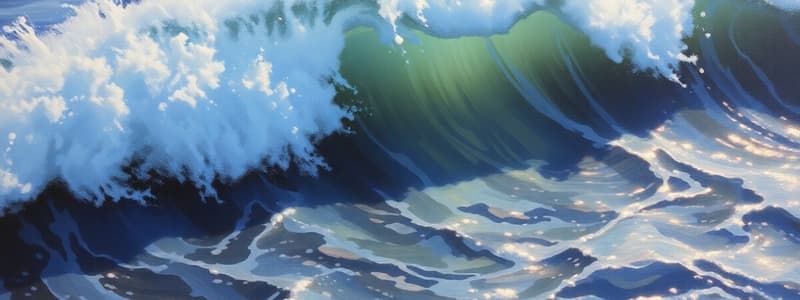Podcast
Questions and Answers
What is the primary characteristic of wave motion?
What is the primary characteristic of wave motion?
- Waves transfer matter through a medium.
- Waves transfer energy without transferring matter. (correct)
- Waves move at a constant speed regardless of frequency.
- Waves only occur in fluids.
How does the angle of incidence relate to the angle of reflection in the context of light reflection?
How does the angle of incidence relate to the angle of reflection in the context of light reflection?
- The angle of incidence is equal to the angle of reflection. (correct)
- The angle of incidence is always greater than the angle of reflection.
- The angle of reflection is dependent on the medium of the light.
- The angle of incidence can vary independently of the angle of reflection.
Which wave property describes the distance between successive crests in a transverse wave?
Which wave property describes the distance between successive crests in a transverse wave?
- Wavelength (correct)
- Wave speed
- Amplitude
- Frequency
In the case of diffraction, what effect does increasing the wavelength have when passing through a narrow gap?
In the case of diffraction, what effect does increasing the wavelength have when passing through a narrow gap?
What is the relationship between wave speed, frequency, and wavelength expressed in the equation $v = f\lambda$?
What is the relationship between wave speed, frequency, and wavelength expressed in the equation $v = f\lambda$?
Flashcards
Wave speed equation
Wave speed equation
Wave speed (v) is equal to frequency (f) multiplied by wavelength (λ).
Transverse wave
Transverse wave
A wave where the vibration is perpendicular to the wave's direction of travel.
Longitudinal wave
Longitudinal wave
A wave where the vibration is parallel to the wave's direction of travel.
Angle of incidence
Angle of incidence
Signup and view all the flashcards
Law of Reflection
Law of Reflection
Signup and view all the flashcards
Study Notes
Unit 2: Syllabus Topic 3: Waves
- Waves transfer energy without transferring matter
- Wave motion can be illustrated by vibrations in ropes, springs, or water
- Key features of a wave: wavefront, wavelength, frequency, crest (peak), trough, amplitude, and wave speed
- Wave speed equation: v = fλ (where v = speed, f = frequency, λ = wavelength)
- Transverse waves: Vibration is perpendicular to propagation (e.g., electromagnetic radiation, water waves, seismic S-waves)
- Longitudinal waves: Vibration is parallel to propagation (e.g., sound waves, seismic P-waves)
- Wave phenomena:
- Reflection at a plane surface
- Refraction due to a change in speed (e.g., change in depth in a ripple tank)
- Diffraction through a narrow gap
- Diffraction at an edge (the effect of wavelength and gap size)
- Ripple tank experiments can demonstrate these phenomena
3.2 Light
- Reflection of light:
- Definitions: normal, angle of incidence, angle of reflection
- Formation of an optical image by a plane mirror:
- Characteristics: same size, same distance from mirror, virtual
- Law of reflection: angle of incidence = angle of reflection
- Simple constructions, measurements, and calculations for reflection by plane mirrors are important tools
Studying That Suits You
Use AI to generate personalized quizzes and flashcards to suit your learning preferences.




